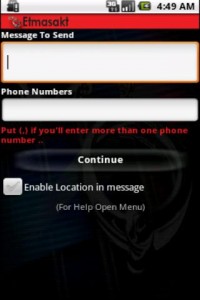The Arab uprisings have created a debate about the role played by social media and mobile technology in bringing change. Whatever conclusion you come to on that subject, activists certainly make use of a wide range of new technologies, and we'll take a look at some of them in this post.
Reporting your arrest
Since the beginning of the Arab uprisings many bloggers and activists have been arrested. In Syria, in the last few months alone, Rima Dali, Safana Baqleh, Ali Mahmoud Othman, Razan Ghazzawi were detained. In Egypt Maikel Nabil Sanad, Alaa Abd El Fattah and Amr Gharbeya were just a few of those arrested. That's without mentioning countries such as Tunisia and Bahrain, as well as the cases where a bloggers or activists were denied entry to Egypt and held for investigation in Cairo airport.
While some of these bloggers and activists were later released, at the time of their arrest many didn't have time to tell their lawyers and family members what was happening. And this is where technology can play a role. A while ago Global Voices Advocacy contributor Ramy Raoof talked about Etmasakt, one such technical solution:
@RamyRaoof: Our friend Mohamed Hussien (@7aloli) developed this application http://bit.ly/Etmasakt to alert people when you get arrested. #Egypt #Android

Etmasakt helps you send short message to multiple numbers (family, lawyer, activists etc.) as well as sending the location where you were arrested.
Etmasakt is an Arabic word that means “I've been arrested”. On his blog Orlando Elkabeer wrote about the application and how it sends an SMS to multiple recipients along with your exact location – grabbed from your phone's GPS – with one click:
Etmasakt is not the only application of its kind. There is also “Byt2ebed 3alia” and “I'm Getting Arrested“; the latter seems to be older with a bigger user base. The existence of these different applications all basically doing the same thing clearly means that there is a need for them.
Live video broadcast
Nothing is worse than recording an important incident with your video camera, then being detained by security forces who destroy your camera, or at least force you to erase your memory card. And this is why Bambuser is very popular tool among activists. The Swedish mobile application lets you shoot videos and upload them instantaneously from your mobile phone; it's like having a video broadcasting station in your pocket.
Before being blocked by the Syrian government, Bambuser was used a lot by Syrians. In February the service reported on its own blog that it had been blocked in Syria:
Over the past weeks the number of Bambuser broadcasts from Syria has increased, with strong footage showing bombings, victims, destruction and terrible conditions at local field hospitals in Syria.
Some live footage like that of the destroyed oil pipeline in Homs was used by major TV channels such as CNN, BBC, AlJazeera and SkyNews:
We believe this footage was the trigger for the Syrian government to block access to bambuser.com and disable the possibility to broadcast live video with mobile phones on Syrian 3G.
In Egypt Tarek Shalaby reported his own arrest via Bambuser, and there were plans for activists to use the service in monitoring the parliamentary elections especially when international observers were not permitted to do so. During the first days of the Egyptian revolution the government decided to block Bambuser, amongst other services, before deciding to turning the whole Internet off two days later.
Other tools
Nancy Messieh of The Next Web has put together basic mobile apps arsenal for activists. Movements.org, which is a non-profit organization dedicated to identifying, connecting, and supporting grassroots digital activists, and advocates for the use of new technologies, has listed dozens of applications that range from Open Source word processing and audio/video editing software to encryption and tunneling software.
There are other less useful applications like this one that tries to document the Egyptian revolution by bringing a gallery of photos taken during the revolution onto your mobile phone.
The downside of automation
Despite the usefulness of the above applications, automation can be a problem. A month ago activist Hossam El Hamalawy received a short message from Mostafa Sheshtawy saying that he got arrested.
@3arabawy: Guys, I received few mins ago a text message from @msheshtawy saying he's getting arrested. I called him, he's not answering.
People were worried about Mostafa Sheshtawy, and only later was it discovered that the message was sent by mistake:
@msheshtawy: Am fine people. Am not arrested or anything. My phone wasnt with me. Am sorry people.
@msheshtawy: Someone clicked on the application while i was asleep. Silly joke and i will screw whoever did this. Am really sorry.
Finally, just like activists and citizens, dictators also use new technology. Authoritarian regimes in the Arab world have had plenty of help from American firms when it comes to censorship and spying on pro-democracy protestors. At the end of the day, technology is a double-edged sword; each side uses it for its own purposes.







1 comment